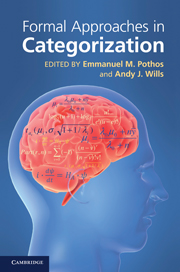Book contents
- Frontmatter
- Contents
- List of figures
- List of tables
- List of contributors
- 1 Introduction
- 2 The generalized context model: an exemplar model of classification
- 3 Prototype models of categorization: basic formulation, predictions, and limitations
- 4 COVIS
- 5 Semantics without categorization
- 6 Models of attentional learning
- 7 An elemental model of associative learning and memory
- 8 Nonparametric Bayesian models of categorization
- 9 The simplicity model of unsupervised categorization
- 10 Adaptive clustering models of categorization
- 11 Cobweb Models of Categorization and Probabilistic Concept Formation
- 12 The knowledge and resonance (KRES) model of category learning
- 13 The contribution (and drawbacks) of models to the study of concepts
- 14 Formal models of categorization: insights from cognitive neuroscience
- 15 Comments on models and categorization theories: the razor's edge
- Index
- References
14 - Formal models of categorization: insights from cognitive neuroscience
Published online by Cambridge University Press: 05 June 2012
- Frontmatter
- Contents
- List of figures
- List of tables
- List of contributors
- 1 Introduction
- 2 The generalized context model: an exemplar model of classification
- 3 Prototype models of categorization: basic formulation, predictions, and limitations
- 4 COVIS
- 5 Semantics without categorization
- 6 Models of attentional learning
- 7 An elemental model of associative learning and memory
- 8 Nonparametric Bayesian models of categorization
- 9 The simplicity model of unsupervised categorization
- 10 Adaptive clustering models of categorization
- 11 Cobweb Models of Categorization and Probabilistic Concept Formation
- 12 The knowledge and resonance (KRES) model of category learning
- 13 The contribution (and drawbacks) of models to the study of concepts
- 14 Formal models of categorization: insights from cognitive neuroscience
- 15 Comments on models and categorization theories: the razor's edge
- Index
- References
Summary
Introduction
Category-specificity is a salient phenomenon in cognitive neuroscience. It has been reported in a wide variety of contexts and experimental paradigms. Much of the theoretically significant observations come from studies of patients with category-specific deficits and from imaging studies. Here, we will discuss how imaging and patient studies of category-specific phenomena can point to potential limitations of formal models of categorization, and inform their future development. We will point out that these models treat categorization in a domain-general manner. That is, categorization of all objects, irrespective of their domain, proceeds according to an identical mechanism. If the models are to encompass categorization of entities from the elementary categories that appear in neuropsychological studies, for example animals, tools, or conspecifics, without abandoning their domain-generality, a question arises as to how domain-specific phenomena can arise in conjunction with a completely domain-general mechanism of categorization. We will argue that an answer to this question is closely related to the theories of organization of conceptual knowledge that originally arose in the context of neuropsychology. These theories, in our opinion, constrain the possible accounts reconciling the domain-generality of formal models with the domain-specific phenomena known from neuropsychology.
The term ‘categorization’ denotes a set of cognitive mechanisms that involve different memory systems (Smith & Grossman, 2008) and vary as a function of the tasks performed and the strategy employed (Ashby & O'Brien, 2005).
Information
- Type
- Chapter
- Information
- Formal Approaches in Categorization , pp. 313 - 324Publisher: Cambridge University PressPrint publication year: 2011
